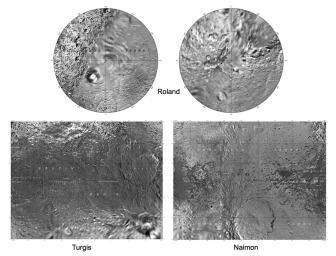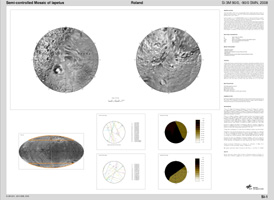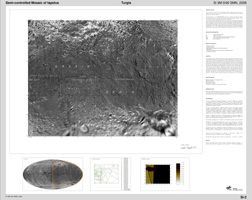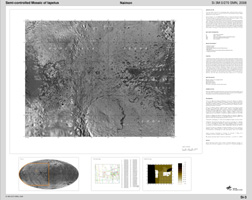
|
The Iapetus Atlas
- Click the image above for a larger view
- Full-Res JPEG (920 x 700) (106.7 kB)
- Full-Res TIFF (920 x 700) (644.9 kB)
Caption:
Presented here is a complete set of cartographic map sheets from a high-resolution Iapetus atlas, a project of the Cassini Imaging Team.
The map sheets form a three-quadrangle series covering the entire surface of Iapetus. As noted on the map, while both Saragossa Terra and Roncevaux Terra are bright regions on the moon's surface, they are distinct from each other in that the former has a slightly reddish color and the latter does not.
The map sheets cover the entire surface of Iapetus at a nominal scale of 1:3,000,000. The map data was acquired by the Cassini imaging experiment. The mean radius of Iapetus used for projection of the maps is 736 kilometers (457 miles). Names for features have been approved by the International Astronomical Union (IAU).
Photomosaic Maps
|
Background Info:
The Cassini-Huygens mission is a cooperative project of NASA, the European Space Agency and the Italian Space Agency. The Jet Propulsion Laboratory, a division of the California Institute of Technology in Pasadena, manages the mission for NASA's Science Mission Directorate, Washington, D.C. The Cassini orbiter and its two onboard cameras were designed, developed and assembled at JPL. The imaging operations center is based at the Space Science Institute in Boulder, Colo.
For more information about the Cassini-Huygens mission visit http://saturn.jpl.nasa.gov/ . The Cassini imaging team homepage is at http://ciclops.org .
Cataloging Keywords:
| Name | Value | Additional Values |
|---|---|---|
| Target | Iapetus | |
| System | Saturn | |
| Target Type | Satellite | |
| Mission | Cassini-Huygens | |
| Instrument Host | Cassini Orbiter | |
| Host Type | Orbiter | |
| Instrument | ||
| Detector | ||
| Extra Keywords | Grayscale, Map | |
| Acquisition Date | ||
| Release Date | 2008-10-17 | |
| Date in Caption | ||
| Image Credit | NASA/JPL/Space Science Institute | |
| Source | photojournal.jpl.nasa.gov/catalog/PIA11115 | |
| Identifier | PIA11115 | |



